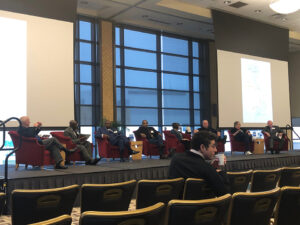
03/12/2020
Kellen Stepler | features editor
A day doesn’t go by that Jim Jenkins doesn’t think about Vietnam.
Jenkins, an army helicopter captain and platoon leader during the 1971 invasion of Laos, said his most memorable event during his time in Vietnam was when 10 members of his platoon were killed in action during a 30-day period.
“It’s that guilt of having led innocent men who have died [in combat],” Jenkins said. “These symposiums have helped cure problems I’ve had, but it’s been a challenge.”
Jenkins, along with seven other Vietnam veterans, shared their stories Wednesday night in the Power Center Ballroom.
The event was started by Duquesne adjunct professor and former high school teacher Robert Rodrigues. Rodrigues, along with Garrett Cooper in 2011. It was sponsored by the Robert M. Rodrigues Fund and is co-sponsored with the Office for Military and Veteran Students and the McAnulty College of Liberal Arts History Department. Each year, the fund holds a public history talk and awards a scholarship to a Chartiers Valley High School senior, where Rodrigues taught for 48 years.
Kathie Swazuk, an army nurse, noted the feeling of togetherness Vietnam soldiers had.
“If you had a hand and you could help, you were part of the team,” Swazuk said. “When I came home, I looked for that team and didn’t find it.”
Curtis Marcus Simmons also noted that when they came back from the war, they “were not welcomed back kindly.” Swazuk also mentioned hearing some American music while serving in Vietnam made some of the soldiers feel “conflicted.”
“We knew how unpopular the war was at home, but we were proud of what we were doing to help our soldiers,” Swazuk said. “We were conflicted.”
The panel also reflected on the Kent State shooting in protest of the war.
“It was kids shooting kids,” Greg Connolly, a Vietnam marine, said.
Jenkins said that he thought part of the riots were due to the draft. In 1969, the U.S. Selective Service System conducted lotteries to determine the order of call to military service in the Vietnam War.
“Kids had to take a position on Vietnam, we had skin in the race,” Jenkins said. “You had to be involved because of the draft.”
Simmons also noted the lessons he learned when he came home from the war.
“Vietnam didn’t play fair,” Simmons said. “Between Jenkins, (panelist) Al Robinson and me, we’ve had 10 lives. Al’s been married four times, me three times and (Jenkins) two. When Al and I returned home, we self-medicated with marijuana, alcohol and women. It was difficult to come home and hug my children after taking other children’s lives.”
Simmons noted that talking out his experiences during the war has helped him cope.
“This process has been one of the most therapeutic things for me,” Simmons said. “I have four siblings, but Al is my real brother. We’ve known each other for 55 plus years, and we never talk about Vietnam. Thanks to Bob [Rodrigues] I can process some of my stuff.”
Vietnam marine George Haught served in the Battle of Hue during the Tet Offensive in February 1968. Rodrigues said that the Tet Offensive was “the turning point of the Vietnam War,” as the Viet Cong attacked cities in south Vietnam. During the Tet Offensive, journalist Walter Cronkite told American viewers at home that there was no way the Americans could win the war, changing how Americans perceived the war.
Haught, who hadn’t talked about Vietnam until five years ago, stood and recalled his experiences going into the city of Hue and the fire upon fire there.
“We all thought we were going to die,” Haught said. “It was just a shooting gallery.”
Concluding the Battle of Hue, 218 U.S. troops were dead and 1,364 were wounded.
“For a 19-year-old, it was really something,” Haught said, as the audience clapped.
At the end of the two-hour panel, Tony Accamando, Vietnam veteran, Duquesne graduate and co-founder of Veterans Cable Services and Friends of Danang, presented the panelists with a Vietnam print that said “no man left behind” as a way to say welcome home.
Tony’s brother, Don, is the director of the office of military and veteran students at Duquesne. He discussed the importance of taking in stories like this.
“Classroom learning is one aspect, but hearing accounts of our neighbors reminding us of the war [is another],” Accamando said.
